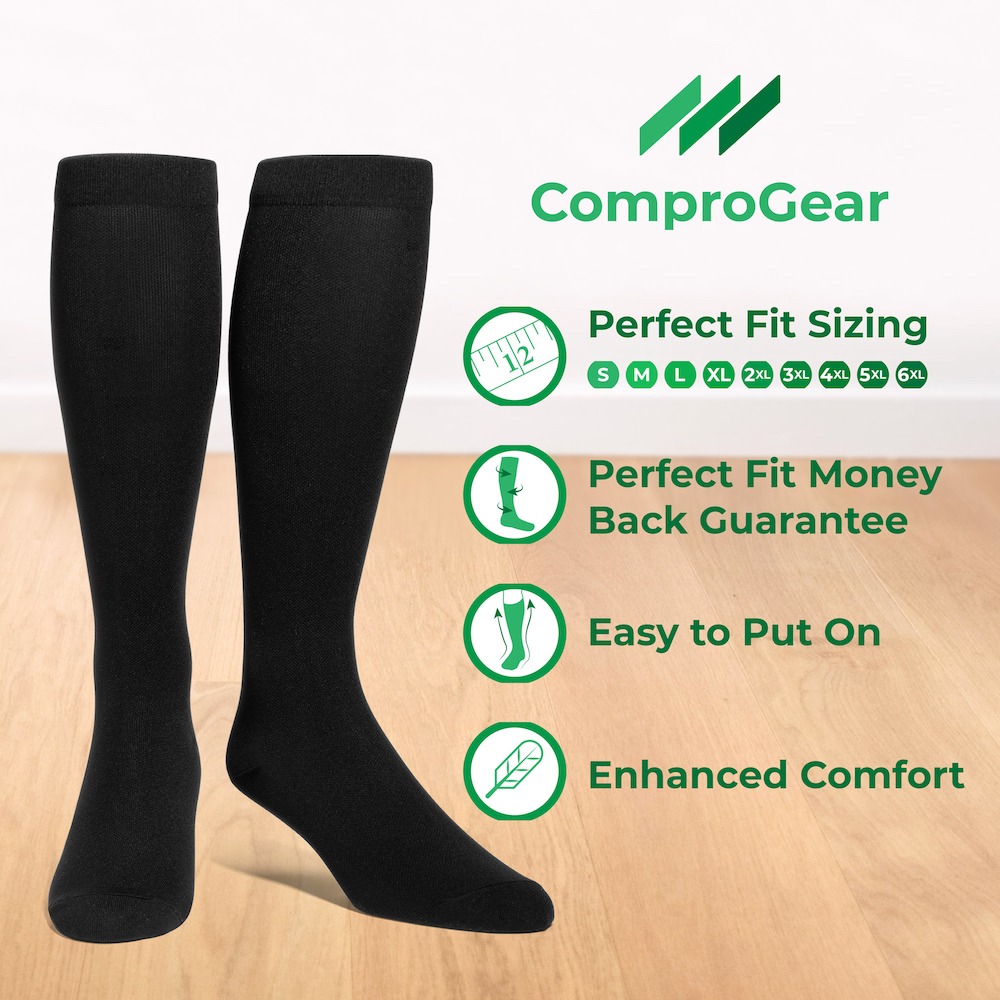It’s no secret that nursing is a physically taxing job. Shifts are notoriously lengthy with little opportunity to sit down as needy patients on over-crowded wards abound. Many nurses are learning that compression socks have the power to help alleviate some of the physical side-effects that nurses experience after being on their feet for hours at a time. From reducing pain to preventing swelling, compression socks are invaluable to those who need them, so that they can take care of others in the process.
Of course, nurses aren’t the only ones who stand to benefit from compression socks. Whether you are an office worker, a professional athlete, a traveler, or a pregnant woman, read on to learn how compression socks might also bring you some relief and prevention of a variety of conditions.
Compression Socks for Nurses
Typically, a nurse will stay on their feet for long hours throughout the day or at night. The effects of these long 12-hour shifts not only bring about fatigue and exhaustion, but also pain and swelling in the legs as well as the potential for secondary conditions such as varicose veins. All of these things together, plus the professional pressure put on nurses to perform at heightened levels, can do a great deal of damage for nurses and even cause burnout.
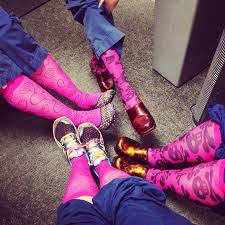
So, why should nurses wear compression socks? The short answer is to address concerns of swelling, soreness, and pain while promoting healthier circulation and mitigating fatigue.
Wearing compression socks can also be effective at preventing certain health concerns and conditions such as varicose veins while keeping the legs looking and feeling better in the meantime.
When used properly, with the appropriate combination of pressure level and size, compression socks can go a long way toward alleviating some of the health problems likely to crop up due to standing for hours on end.
Wearing Compressions Socks is Good for Nurses Because:
- They contribute to the reduction of pain
- Reduce swelling
- Help prevent or reduce the development of varicose veins
- Fatigue Reduction
- Add a personal aesthetic to the uniform
Reasons Why Every Nurse needs Compression Socks

1. Reduce soreness and pain
A nurse who uses compression socks will likely find that they can reduce the effect of leg soreness and pain that results from long hours on their feet. The pressure placed on the leg helps to promote better circulation which, in turn, provides more oxygen to the entire body. Also, the pressure from compression socks helps to reduce the buildup of lactic acid in the muscles, thereby reducing muscle pain and soreness that can come from a particularly physically strenuous day.
Many nurses who have used compression socks say that they have seen a noticeable reduction in pain and soreness when compared to before they incorporated them into their wardrobe. They give the comfort needed to continue working for long hours. Studies also show that wearing these socks consistently helps avoid potential pain, even when nurses are off the clock and in need of rest and recovery.

2. Minimize foot swelling
Nurses who spend a lot of time on their feet are actually fighting against gravity! As the earth pulls down on the body, the body often succumbs to the pressure and fluids have a tendency to build up around the ankles and feet.
Compressions socks help to fight against gravity and prevent fluid from pooling down at the bottom. Instead, it promotes circulation and a healthy balance of fluids flowing all throughout the body.
Popular Articles on ComproGear
Best Compression Socks for Nurses Best Socks for Nurses
3. Prevent varicose veins
If you worry about varicose veins from standing, or you have them already, then consider getting compression socks.
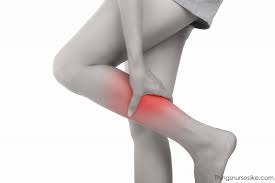
Many people have reported how they experience excruciating pain, fatigue and uncontrolled itching on their legs which comes from the dilation of veins that causes the accumulation of blood and unsightly colored bulges, often in the legs.
Since they spend a lot of time on their feet, nurses are especially susceptible to the development of varicose veins, again, due to the fight against gravity. Compression socks hold in compromised veins and promote healthy circulation to combat varicose veins and spider veins.
For those who already have varicose veins, compression socks can give support to the blood vessels and reduce the painful, uncomfortable symptoms (and bulging appearance) of varicose veins.
4. Fatigue Reduction
Compression socks can take the strain off of your feet and legs, thereby preventing pain and swelling associated with standing for long periods of time. Consequently, you can feel more relaxed and physically comfortable for longer periods of time.
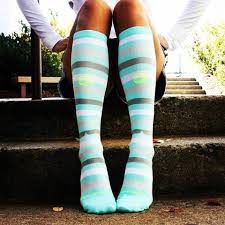
Nurses deserve to spend their off-duty time pain-free. Compression socks help reduce fatigue and relax the muscles in the feet and lower legs, relieving any residual soreness and warding off burn-out.
So, there you have it: grab yourself several pairs of compression stockings and feel less fatigued even on your day off!
5. They’re Cute to Wear!
Wearing a plain uniform can be boring at times. On top of the physical benefits that compression socks offer, they come in many colors and patterns, allowing you to spruce up your workplace wardrobe.
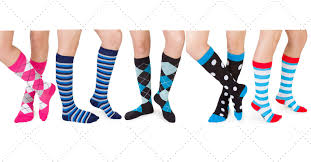
There is no harm in a nurse wearing some nice looking compression socks to enhance their mood and confidence. Many compression socks now come in all sorts of colors and styles to match up or contrast with the cool scrubs nurses are wearing these days. They’re so fun and stylish, no one will even guess that you’re even wearing compression socks!
Shopping for Compression Socks for Nurses
Are you wondering which compression socks will fit your needs? If you’re a nurse, you’re in luck. There are countless options and styles to choose from!
Check with your doctor or pharmacist and then consider these factors when you’re making decisions about which compression socks will be right for you.
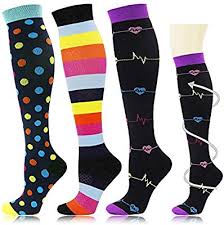
1. Graduated Pressure
Most compression socks are tighter at the ankle, where gravity pulls the hardest, and loosen as they move up the calf and leg. This allows the body to naturally push blood and fluids back up to the body’s core, preventing it from pooling around the ankles and feet.
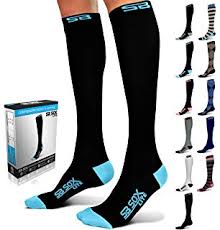
2. Size Options
When purchasing compression socks, don’t fall for the idea that One-Size-Fits-All! People come in all shapes and sizes. In order for your compression socks to work, they need to be fitted to your measurements. Be sure to buy from a company that offers a range of sizes for your particular needs.
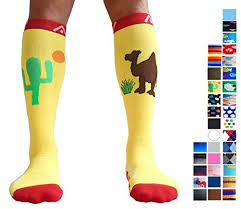
3. Online Availability
Busy nurses don’t have time to run around shopping for socks! Choose a company that offers quality purchasing options that can be delivered to your door simply and easily.
4. Customer Satisfaction Policy
When purchasing compression socks, you want to work with a company that stands behind their product. Whether allowing you to exchange for another size or get a refund if you aren’t satisfied, this is a vital part of earning your trust!
5. Pressure
Compression socks may come in a variety of pressure levels (measured in mmHg–millimeters of Mercury). The most commonly recommended level of pressure is 20-30 mmHg, which means that the highest pressure (30 mmHg) is placed at the ankle and it gradually lessens to 20 mmHg around the calf.
Conclusion
If you are a nurse or other professional who stands a lot, you may be wondering if you should try compression socks. The answer is a resounding YES. Even though it’s a small investment and only a tiny change in your daily routine, it could make all the difference in the world for your professional and personal life!
